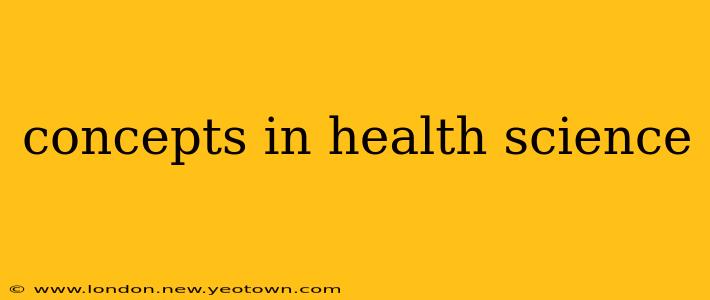Unveiling the Intriguing World of Health Science Concepts: A Journey of Discovery
The field of health science is a vast and ever-evolving landscape, encompassing a multitude of interconnected concepts that shape our understanding of the human body, disease, and well-being. From the microscopic world of cells to the complex systems of the human body, health science delves into the intricacies of life itself. Let's embark on a journey to explore some of the key concepts that underpin this fascinating field.
What are the main branches of health science?
Health science isn't a monolithic entity; it's a diverse field with many specialized branches. Imagine it as a sprawling tree, with its roots firmly planted in fundamental biological principles and its branches reaching out to encompass various disciplines. Some of the major branches include:
-
Biomedical Sciences: This forms the bedrock, focusing on the biological mechanisms of health and disease. It includes areas like anatomy, physiology, microbiology, and genetics, providing the fundamental knowledge needed to understand how the body works and what goes wrong when illness strikes.
-
Public Health: This branch takes a broader, societal approach, focusing on preventing disease and promoting health within populations. Epidemiologists, for example, study disease patterns and outbreaks to implement effective prevention strategies.
-
Clinical Sciences: This encompasses the direct care of patients, encompassing medicine, nursing, physiotherapy, and other allied health professions. It’s the practical application of the knowledge gained from biomedical and public health sciences.
-
Health Informatics: In our increasingly data-driven world, health informatics plays a crucial role in managing and analyzing health information, improving patient care, and facilitating research.
This is just a snapshot; many other specialized areas, like epidemiology, nutrition, pharmacology, and health administration, further enrich the tapestry of health science.
What are some important concepts in health science?
Numerous important concepts weave through the fabric of health science. Understanding these concepts is crucial for comprehending health, disease, and the ongoing quest to improve human well-being. Let's delve into a few:
-
Homeostasis: This fundamental concept describes the body's remarkable ability to maintain a stable internal environment despite external changes. Think of it as the body's internal thermostat, constantly adjusting to keep things in balance. Disruptions to homeostasis often lead to illness.
-
Pathophysiology: This fascinating area explores the functional changes associated with disease. It delves into the "why" behind the symptoms we experience when we're unwell, examining the mechanisms by which diseases disrupt the body's normal processes.
-
Epidemiology: As mentioned earlier, this branch focuses on the distribution and determinants of health and disease within populations. Understanding epidemiological principles is essential for tracking outbreaks, identifying risk factors, and implementing effective public health interventions.
-
Genetics and Genomics: The role of genes and their interaction with the environment in influencing health and disease is increasingly recognized. Genomics, the study of an organism's complete set of genes, provides powerful tools for understanding disease susceptibility and developing targeted treatments.
What are some emerging trends in health science?
Health science is a dynamic field, constantly evolving with exciting new developments. Some of the most promising emerging trends include:
-
Personalized Medicine: This approach tailors medical treatment to individual patients based on their unique genetic makeup and other factors. It aims to improve treatment efficacy and reduce side effects.
-
Artificial Intelligence (AI) in Healthcare: AI is revolutionizing many aspects of healthcare, from diagnosis and treatment planning to drug discovery and patient monitoring.
-
Big Data and Health Analytics: The ability to collect and analyze massive amounts of health data is providing unprecedented insights into disease patterns, treatment effectiveness, and health outcomes.
-
Focus on Preventative Care: A growing emphasis is placed on preventing illness rather than simply treating it, promoting healthy lifestyles and early detection strategies.
How can I learn more about health science concepts?
The world of health science is vast and captivating. To deepen your understanding, consider exploring introductory textbooks, reputable online resources, and even engaging in further education or training in a specific area that piques your interest. Numerous universities and colleges offer degrees and courses in various health science disciplines. Stay curious, keep learning, and you'll uncover a treasure trove of knowledge in this fascinating field.
This journey into the world of health science concepts is just the beginning. Each concept mentioned here opens doors to further exploration and deeper understanding. So, keep asking questions, keep learning, and keep discovering the wonders of the human body and its intricate relationship with health and disease.

